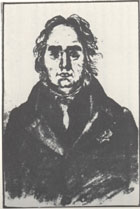Gerhard Friedrich Müller facts for kids
Gerhard Friedrich Müller (born October 29, 1705 – died October 22, 1783) was an important historian and one of the first people to study different cultures. He was born in Germany but spent most of his life working in Russia.
Contents
Early Life and Studies
Gerhard Friedrich Müller was born in a town called Herford in Germany. He went to Leipzig University to study. In 1725, when he was 20 years old, he was invited to St. Petersburg in Russia. He helped start the Imperial Academy of Sciences there. This was a big deal, as it was a new place for scientists to work and learn.
Exploring Siberia and Studying Cultures
Müller took part in a huge journey called the second Kamchatka expedition. This expedition explored the eastern side of the Ural mountain range. From 1733 to 1743, Müller and 18 other scientists and artists traveled through Siberia. They studied the people and cultures there. They also collected information to create new maps.
Müller carefully described the clothes, religions, and traditions of the different groups of people in Siberia. Because of his detailed work, he is often called the father of ethnography. Ethnography is the study of human cultures and societies.
A Historian of Russia
After his long journey in Siberia, Müller became a historiographer for the Russian Empire. This meant he was an official historian. He was one of the first historians to write a complete history of Russia. He based his work on many old documents and records.
Müller believed that people from Scandinavia and Germany played a big role in Russia's early history. This idea was part of something called the Normanist theory. This view made some people, like Mikhail Lomonosov, upset. Lomonosov was a famous Russian scientist who had supported Müller before. This disagreement made Müller's career in Russia more difficult.
In the early 1760s, Müller found an important old document. It was called the List of Russian Cities, Near and Far. Later, his colleague August Ludwig von Schlözer published this list in Russian in 1816.
In 1766, after facing many challenges from other scholars, Müller was given an important job. He became the keeper of Russia's national archives. He also helped put together a collection of government agreements.
Later Life
In 1761, Müller was chosen as a foreign member of the Royal Swedish Academy of Sciences. He passed away in Moscow when he was 77 years old.
See also
- List of Russian historians
 | Leon Lynch |
 | Milton P. Webster |
 | Ferdinand Smith |


